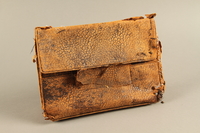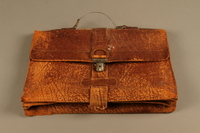Overview
- Description
- The collection documents the Korman and Maizels (formerly Majzels) families, originally of Kraśnik, Poland, before and after the Holocaust. Documents include identification documents issued to Szlama Majzels (later Samuel Maizels) and Runia Majzels (née Korman, later Runia Maizels); an affidavit affirming Szlama and Runia’s identities, marriage, and daughter Noma’s (Naomi) birth; and death certificates for Runia’s father Kiwa Korman, her siblings Abraham Korman and Chana Korman Kucheik, and Szlama’s father Chaim Ezril Majzels. Prewar family photos mailed to relatives in the United States comprise the bulk of the photographs in the collection. A photograph depicting Runia Majzels and a friend, Sara Szechter, in Hamburg around 1945 bears an inscription that references the false identities they used during the war -- Jozefa and Ala, respectively.
- Date
-
inclusive:
circa 1928
- Credit Line
- United States Holocaust Memorial Museum Collection, Gift of Frances Maizels Rifkin, in memory of her parents Runia Korman Maizels and Szlama Maizels.
- Collection Creator
- Szlama Maizels
Runia K. Maizels - Biography
-
Szlama Maizels (later Samuel, 1916-1958) was born in Krasnik, Poland, to Chaim Ezril and Fajga (nee Halpern) Majzels. Szlama had a younger brother, Szulim (Shulom,1925-1942). He worked as a furrier. In September 1939, Poland was invaded by Germany and the Soviet Union. Kraśnik was occupied by the German Army on September 15, 1939. On August 26, 1940, Szlama married Runia Korman (1918-1985), who was also born in Krasnik.
During the war, Szlama was imprisoned for a time in Gross Rosen concentration camp, where he was assigned prisoner number 69257. On October 21, 1944, Szlama was one of 700 men transferred to the Brünnlitz subcamp to work at Oskar Schindler’s arms factory in German-occupied Czechoslovakia. Soviet troops entered the camp on May 10, three days after the German surrender. His brother, Szulim, and several other relatives were killed in the Majdanek subcamp Budzyń in fall 1942.
Szlama was reunited with his wife, Runia, after the war in Hamburg. At some point, Runia had likely lived under the false-identity of “Jozefa,” and was in several forced-labor camps. She was liberated from Bergen-Belsen on April 15, 1945 by the British Army. Their daughter, Noma (Naomi), was born in Hamburg on March 8, 1947. The family immigrated to the United States in December 1950 and settled in Baltimore, Maryland. They changed their last name from Majzels to Maizels, and Szlama changed his name to Samuel. They had two more children: Harvey (b. 1952) and Frances (b. 1956). After Szlama’s death, she married Alex Jacobs (born Alkun Jakubowicz, 1912-1997), a Holocaust survivor originally from Kalisz, Poland.
Runia Korman Maizels (1918-1985) was born Runia Korman on September 19, 1918 in Kraśnik, Poland, to Kiwa and Noma Brucha Korman (née Goldner). Her father Kiwa Korman (circa 1887-1942) was the son of Josef Hersch Korman and Sura Chana Korman (née Akierman, b. circa 1889). Runia had one sister Chana (later Chana Kucheik, 1920-1942) and a brother, Abraham (1922-1942).
In September 1939, Poland was invaded by Germany and the Soviet Union. Kraśnik was occupied by the German Army on September 15, 1939. Runia married Szlama Majzels (1916-1958) on August 26, 1940. Runia was transported from Kraśnik to Lublin on February 9, 1941. At some point, Runia likely lived under the false-identity of “Jozefa,” and was in several forced-labor camps. She was liberated from Bergen-Belsen on April 15, 1945 by the British Army. Runia’s siblings and parents were all killed in the Majdanek subcamp Budzyń in fall 1942.
She was reunited with her husband Szlama in Hamburg after the war. He was a survivor of Gross-Rosen and the Brünnlitz subcamp where he worked in Oskar Schindler’s arms factory. Their daughter, Noma (Naomi), was born in Hamburg on March 8, 1947. The family immigrated to the United States in December 1950 and settled in Baltimore, Maryland. They changed their last name from Majzels to Maizels, and Szlama changed his name to Samuel. They had two more children: Harvey (b. 1952) and Frances (b. 1956). After Runia’s husband’s death, she married Alex Jacobs (born Alkun Jakubowicz, 1912-1997), a Holocaust survivor originally from Kalisz, Poland.
Physical Details
- Genre/Form
- Photographs. Certificates. Identification card.
- Extent
-
1 folder
- System of Arrangement
- The collection is arranged as a single folder.
Rights & Restrictions
- Conditions on Access
- There are no known restrictions on access to this material.
- Conditions on Use
- Material(s) in this collection may be protected by copyright and/or related rights. You do not require further permission from the Museum to use this material. The user is solely responsible for making a determination as to if and how the material may be used.
Keywords & Subjects
- Topical Term
- Jews--Poland--Krasnik. Holocaust survivors--Poland.
- Geographic Name
- Krasnik (Poland) Hamburg (Germany)
- Corporate Name
- Gross-Rosen (Concentration camp)
Administrative Notes
- Holder of Originals
-
United States Holocaust Memorial Museum
- Legal Status
- Permanent Collection
- Provenance
- Donated to the United States Holocaust Memorial Museum in 2018 by Frances Maizels Rifkin, daughter of Runia Korman Maizels and Szlama Maizels.
- Record last modified:
- 2023-10-26 13:54:27
- This page:
- https://collections.ushmm.org/search/catalog/irn595123
Download & Licensing
- In Copyright - Use Permitted
- Terms of Use
- This record is not digitized and cannot be downloaded online.
In-Person Research
- Not Available for Research: Out for Digitization
- Plan a Research Visit
-
Request in Shapell Center Reading Room
Bowie, MD
Contact Us
Also in Korman and Maizels families collection
The collection consists of a purse, a briefcase, documents, and photographs relating to the experiences of the Maizels and Korman families in Poland and Germany before, during, and after the Holocaust.
Date: 1942-1947

Leather clutch purse owned by Runia Korman Maizels
Object
Leather clutch purse used by Runia and Szlama Majzels (later Samuel Maizels) when they emigrated from Hamburg, Germany, to Baltimore, Maryland in 1950. Runia and Szlama were both born in Kraśnik, Poland. German forces occupied Kraśnik on September 15. Runia was transported from Kraśnik to Lublin on February 9, 1941. At some point, Runia likely lived under the false identity of “Jozefa,” and was in several forced labor camps. She was liberated from Bergen-Belsen on April 15, 1945 by the British Army. She was reunited with her husband, Szlama, in Hamburg after the war. He was a survivor of Gross-Rosen and the Brünnlitz subcamp where he worked in Oskar Schindler’s arms factory. Their daughter, Noma (Naomi), was born in Hamburg in 1947. The family immigrated to the United States in December 1950, and settled in Baltimore, Maryland. They changed their last name from Majzels to Maizels, and Szlama changed his name to Samuel. They had two more children: Harvey (b. 1952) and Frances (b. 1956). Several members of Runia and Szlama’s families were imprisoned in the Budzyń labor camp near Krasnik, and died around November 1942.

Leather briefcase owned by Runia Korman Maizels and Szlama Maizels
Object
Leather briefcase used by Runia and Szlama Majzels (later Samuel Maizels) when they emigrated from Hamburg, Germany, to Baltimore, Maryland in 1950. Runia and Szlama were both born in Kraśnik, Poland. German forces occupied Kraśnik on September 15. Runia was transported from Kraśnik to Lublin on February 9, 1941. At some point, Runia likely lived under the false identity of “Jozefa,” and was in several forced labor camps. She was liberated from Bergen-Belsen on April 15, 1945 by the British Army. She was reunited with her husband, Szlama, in Hamburg after the war. He was a survivor of Gross-Rosen and the Brünnlitz subcamp where he worked in Oskar Schindler’s arms factory. Their daughter, Noma (Naomi), was born in Hamburg in 1947. The family immigrated to the United States in December 1950, and settled in Baltimore, Maryland. They changed their last name from Majzels to Maizels, and Szlama changed his name to Samuel. They had two more children: Harvey (b. 1952) and Frances (b. 1956). Several members of Runia and Szlama’s families were imprisoned in the Budzyń labor camp near Krasnik, and died around November 1942.



